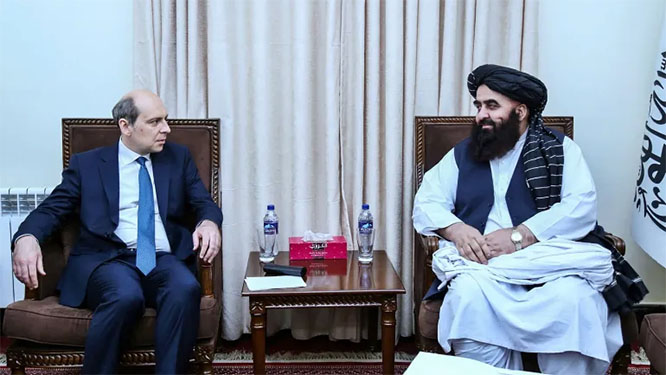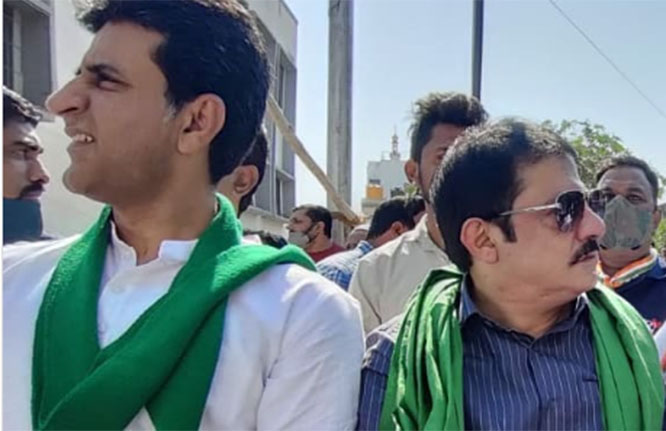
Moscow, July 4: Russia has officially recognized the Taliban government as Afghanistan's rightful government, the first country to do so nearly four years since the extremists took power. The action is a diplomatic victory for the Taliban and underscores Russia's increasing influence in Central Asia and South Asia, the New York Times reported.
In a statement on X, Afghanistan's Foreign Ministry confirmed that Russian Ambassador Dmitry Zhirnov conveyed the Kremlin's acknowledgement during a meeting in Kabul with Taliban foreign minister Amir Khan Muttaqi. The Russian Foreign Ministry declared the move would provide "impetus to the development of productive bilateral cooperation" in trade, energy, and infrastructure.
A diplomatic win for the Taliban
The formal acknowledgment is a major victory for the Taliban. In spite of repeated attempts at rapprochement, the movement had not managed to gain legitimacy, since Western and most Islamic countries had maintained diplomatic ties at a bare minimum.
However, with time, attitudes have changed globally. With the Taliban firmly in place and with no sign of internal collapse, different countries have begun exploring pragmatic contacts, albeit short of recognition. The Russian step is a continuation of those steps, following China's infrastructure overtures, India's resumption of visa grants, and low-key diplomatic moves by Germany and others.
"Such acknowledgment by Russia provides not only diplomatic legitimacy but also bargaining power for the Taliban to demand more action from unwilling countries," according to Tom Ramage, Brussels-based foreign policy analyst.
The designation is the culmination of heightened ties between Moscow and Kabul over the past few years. In April, Russia's supreme court removed the Taliban from its official list of terrorist organizations, a designation that had been in place more than two decades previously. That move set the stage for more collaboration on security, notably against the Islamic State affiliate ISIS-K, which has become a common threat to both regimes.
ISIS-K launched a vicious attack in March 2024 against a Moscow-region concert hall that killed over 130. The group also targeted the Russian Embassy in Kabul in the past, giving Moscow all the more impetus to assist the Taliban in counterterrorism and intelligence efforts.
Russia's Foreign Ministry emphasized that enhanced cooperation would include energy, agriculture, and transport infrastructure. Moscow is keen on better access to Afghan mineral wealth and trade routes linking Central Asia with South Asia and beyond.
A change in the international landscape
While Russia's move is singular in that it was the only complete recognition, it is one aspect of a broader rebalancing of foreign relations towards Afghanistan. China has pledged to extend its Belt and Road infrastructure projects into the country, and the United Arab Emirates and Iran remain two of Afghanistan's largest trade partners.
Germany, in turn, is considering a deal with the Taliban to deport Afghan nationals residing illegally in Germany. Though not an official recognition, it does acknowledge the de facto rule of the Taliban over the state machinery.
The United States is also firmly opposed to recognition, pointing to the continued oppression of women by the Taliban, such as banning girls from schooling beyond sixth grade and restricting the employment of women. US officials have also rejected any effort to release Afghan central bank funds unless there are concrete human rights guarantees.
A complicated history
Russia's move has a historic significance. The Soviet Union had invaded Afghanistan in 1979 and engaged in a long, harsh conflict with US-supported mujahedeen fighters for a decade, killing almost 15,000 Soviet troops. Now, Moscow is seeking influence in the area through diplomacy, not military might, trying to fill a void left by the United States after it withdrew from the country in 2021.
Foreign Minister Muttaqi welcomed the recognition as "an opportunity for other countries to follow." The Taliban hopes it will lead to greater economic investment and increased legitimacy, though obstacles remain. While Russia welcomed the Taliban, most of the world still denies it legitimacy in its form of government, and aid only comes in under tight controls.
As Moscow makes a comeback as an international player and Kabul looks for partners willing to ignore its human rights abuses, Thursday's statement marks a turning point in the geopolitics of post-US Afghanistan.








Comments
Add new comment